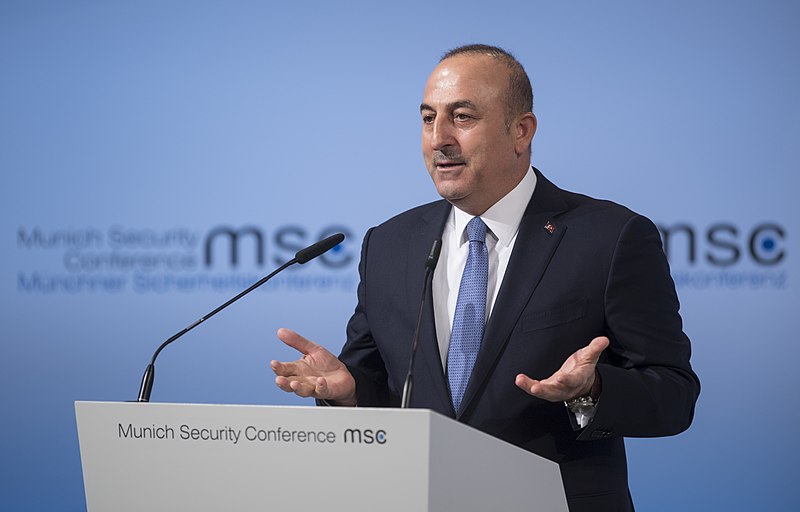Turkey has called on Sweden to take more action regarding the extraditions Ankara seeks in order to secure support for the NATO alliance. Turkey’s top diplomat called for more tangible action following a Swedish Supreme Court ruling that blocked the extradition of a Turkish journalist.
Speaking at a joint news conference in Ankara, Turkish foreign minister Mevlut Cavosoglu said on Thursday that Sweden has not taken further action, such as extraditions and asset freezes on people Ankara considers terrorists. Cavosoglu’s Swedish counterpart Tobias Billstrom, however, said that there has been progress in Stockholm’s efforts to meet Turkey’s demands in order to gain Ankara’s approval for the country to join NATO.
“We have initiated steps on every paragraph and we will continue to implement it. We have increased our legal cooperation with Turkey concerning suspended terrorists,” said Billstrom, referring to the trilateral agreement between Turkey, Finland, and Sweden that was made to lift Ankara’s veto over the Nordic countries’ bids to join the alliance.
Finland and Sweden filed a joint application to join the NATO alliance this year as a result of Russia’s invasion of Ukraine. Most of the NATO countries have ratified their membership bids, with Turkey and Hungary remaining. Cavosoglu welcomed Stockholm’s initiatives but urged them to take more action.
“However, there is no concrete development regarding the extradition of terrorism-related criminals and the freezing of their assets,” said Cavosoglu. “If Sweden wants to be a NATO ally, we have to see concrete cooperation. The negotiations are carried out in a positive atmosphere, but the denial of extradition of Kenes has intoxicated this atmosphere.”
Cavosoglu was referring to Turkish journalist Bulent Kenes, who is accused of staging a coup attempt back in 2016.
The Swedish Supreme Court ruled to block the extradition of Kenes, adding that there were “hindrances” that prevented the extradition to be done. Sweden’s highest court said that some of the accusations Ankara levies on Kenes are not considered crimes in Sweden, and along with the political nature and Kenes’ status as a refugee, extradition would be impossible.
Judge Peter Asp said in a statement that there was also the possibility that Kenes faces persecution simply due to his political beliefs.



 European Allies Deploy Air Defenses to Cyprus After Drone Attack on RAF Akrotiri Base
European Allies Deploy Air Defenses to Cyprus After Drone Attack on RAF Akrotiri Base  Israel-Hezbollah Escalation Deepens Lebanon’s Role in Middle East Conflict
Israel-Hezbollah Escalation Deepens Lebanon’s Role in Middle East Conflict  U.S. Officials Review Tencent’s Stakes in Epic Games, Riot Games Over Security Concerns
U.S. Officials Review Tencent’s Stakes in Epic Games, Riot Games Over Security Concerns  U.S. Military Strikes on Iran Complicate Xi-Trump Summit and Expose China’s Energy Risks
U.S. Military Strikes on Iran Complicate Xi-Trump Summit and Expose China’s Energy Risks  Michael Whatley Wins North Carolina GOP Senate Primary, Setting Up High-Stakes Battle With Roy Cooper
Michael Whatley Wins North Carolina GOP Senate Primary, Setting Up High-Stakes Battle With Roy Cooper  Pentagon Downplays ‘Endless War’ Fears After U.S. Strikes on Iran Escalate Conflict
Pentagon Downplays ‘Endless War’ Fears After U.S. Strikes on Iran Escalate Conflict  Why did Iran bomb Dubai? A Middle East expert explains the regional alliances at play
Why did Iran bomb Dubai? A Middle East expert explains the regional alliances at play  Trump Says U.S.-UK Relationship Has Deteriorated After Starmer Hesitates on Iran Strikes
Trump Says U.S.-UK Relationship Has Deteriorated After Starmer Hesitates on Iran Strikes  Iran Detains U.S. Citizens Amid Escalating Conflict With the United States and Israel
Iran Detains U.S. Citizens Amid Escalating Conflict With the United States and Israel  Trump to Attend White House Correspondents’ Dinner 2026, Ending Long Boycott
Trump to Attend White House Correspondents’ Dinner 2026, Ending Long Boycott  Melania Trump Chairs Historic U.N. Security Council Meeting on Children Amid Iran Conflict
Melania Trump Chairs Historic U.N. Security Council Meeting on Children Amid Iran Conflict  U.S. Interior Department Responds to Leak of Trump Administration Plans to Revise National Park History
U.S. Interior Department Responds to Leak of Trump Administration Plans to Revise National Park History  Israel Prepares Weeks-Long Military Campaign Against Iran Amid Escalating Air Strikes
Israel Prepares Weeks-Long Military Campaign Against Iran Amid Escalating Air Strikes  U.S. Middle East Strikes Raise Indo-Pacific Security Concerns for Japan, South Korea, and Taiwan
U.S. Middle East Strikes Raise Indo-Pacific Security Concerns for Japan, South Korea, and Taiwan  Trump Offers U.S. Insurance and Naval Escort for Tankers as Strait of Hormuz Crisis Disrupts Global Oil Trade
Trump Offers U.S. Insurance and Naval Escort for Tankers as Strait of Hormuz Crisis Disrupts Global Oil Trade  U.S. Preparing Possible Corruption Charges Against Venezuelan President Delcy Rodriguez
U.S. Preparing Possible Corruption Charges Against Venezuelan President Delcy Rodriguez  Trump’s Iran Strikes Spark War Powers Clash in Congress
Trump’s Iran Strikes Spark War Powers Clash in Congress 































